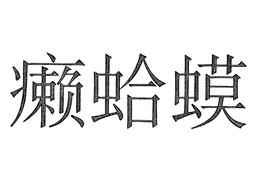(单词翻译:单击)

The word 'toad' would be a snap in an English-language spelling bee, but not in a nationally televised contest in China.
在英语拼写比赛中,“toad”(癞蛤蟆)这个词对参赛选手来说可算是易如反掌,但在中国举办的一场全国直播的汉字听写大会上,“癞蛤蟆”这个词却让选手栽了跟头。
In Chinese, toad has three characters that are made up of 46 individual strokes.
在中文里,“癞蛤蟆”这三个字笔画共有46笔。
Yu Shuang, a 14-year-old contestant, came close in an early round. As her teammates squealed and drew out the word in the air, Miss Yu quickly wrote the characters on a screen that projected her effort on a big display above her head.
14岁的参赛选手余爽在早轮比赛中差点就写对了。在书写“癞蛤蟆”这三个字的时候,余爽很快就在平板电脑上写了出来,她写的这三个字在她头顶上方的一块大屏幕上显示出来。她的队友则叫着用手在空中比划着这几个字。
When she finished, one of three judges hit the buzzer signaling a correct answer, bringing cheers. But the other two didn't agree, pointing out that the young girl had missed a single dot in the third character. 'You were obviously very nervous just now,' said the judge, as Miss Yu's teammates groaned in disappointment backstage.
她写完后,三名评委中的一位按下了书写正确的按钮,全场一片欢呼。但另外两名评委认为她没有写对,他们指出这个女孩在写“蟆”的时候少了一个点。这名评委说,你刚才显然很紧张。余爽的队友则在后台失望地叹息。
Miss Yu wasn't alone. The show tested a group of adults in the audience, and just 30% of them could write toad correctly, state media lamented after the broadcast. 'It's a word that everyone knows,' said the Xinhua News Agency.
并非只有余爽如此。国有媒体在赛后不无遗憾地说,《汉字听写大会》对部分现场观众进行了测试,其中只有30%的人能够把“癞蛤蟆”正确地写出来。新华社说,这是个大家都认识的词。
Since its debut in August on a minor TV channel dedicated to educational programming, the 'Chinese Characters Dictation Competition' has exploded in popularity.
自今年8月,《汉字听写大会》在一个较小的教育频道开播以来,其人气逐渐爆棚。
The show shifted to a Friday evening time slot on CCTV1, even challenging the popularity of the country's most-watched shows, including China's version of 'The Voice.'
上周五晚间,比赛改到中央电视台综合频道播出,甚至挑战中国诸多收视冠军节目的人气,其中包括《中国好声音》。
Friday night's final was a must-watch contest all over China that came down to two secondary-school girls from the same school in the affluent city of Hangzhou.
上周五晚间的决赛成为全国观众必看的比赛,决赛在来自同一所杭州学校的两名女中学生之间展开。
The show has touched a nerve in China, where purists complain that smartphones are eroding language skills, thanks to the frequent use of emoticons and software that lets people write faster using the pinyin system, where Chinese words are written phonetically in Latin script.
《汉字听写大会》触动了中国人的一根神经。在中国,纯粹主义者抱怨说,由于表情符号和能够使人们写字更快的拼音输入法的大量使用,智能手机正在腐蚀人们的语言技能。在使用拼音输入法时,汉字用汉语拼音拼写出来。
Its creator, Guan Zhengwen, said his inspiration came from the Scripps National Spelling Bee in the U.S. In particular, he said he was touched by watching a grandfather who had taken part in the spelling bee 50 years ago and then prepared his grandson to compete.
《汉字听写大会》节目组总导演关正文说,他的灵感来自美国的全国拼写大赛(Scripps National Spelling Bee)。尤其值得一提的是,他说,他尤为感动的是看到一个50年前曾参加拼写大赛的祖父,现在帮助孙子备赛。
'In a diverse country like America, the spelling bee allows people from different backgrounds to find common ground in an American dream that they share in,' said Mr. Guan.
关正文说,在像美国这样一个多元化的国家,拼写大会使背景不同的人们能够在共同的美国梦中找到共同点。
Mandarin has been an important part of the government's strategy to unify a vast country that spans the Uighur-speaking Muslims of the far West, and the dialects of Cantonese and Fujianese in the south. Contestants from various ethnic minority groups in China also took part in the competition in their ethnic dress, underscoring the idea that Chinese language brings the country together.
普通话一直是中国政府团结各族人民的战略的一个重要组成部分,在中国这个幅员辽阔的国家,西部有讲维语的穆斯林,南方则有人讲广东和福建方言。来自中国各少数民族的参赛选手还参加了民族服装的展示,凸显中国语言将国家团结起来的理念。
Some have been extremely outspoken on the issue. Wang Xuming, a former spokesman of the Ministry of Education, launched a campaign on his Weibo microblogging page, calling for the abolishment of English classes in primary schools and for putting more emphasis on studying Chinese.
在这一问题上,一些人的发表了相当激烈的言论。前教育部新闻发言人王旭明就在自己的微博发起了一次运动,呼吁取消小学英语课,增加国学教育。
'Save the children, save the Chinese language, save our culture!' he tweets frequently on his account, which has about 1.8 million followers.
他经常在自己的微博上呼吁,解放孩子,救救国学和汉语。他在新浪微博有约180万粉丝。
The hope is that the show could reinvigorate enthusiasm for the language, which is 'one of the most spectacular treasures of Chinese civilization' and 'the fifth big invention the Chinese people have given to humanity,' according to the show's mission statement. The so-called 'four great inventions' from China typically are listed as paper, gunpowder, the compass and printing.
这个节目的初衷是,重新唤起人们对汉语的热情。该节目的“宗旨和意义”称,汉字是是中华文明最灿烂的瑰宝之一,是中国贡献于人类文明的第五大发明。来自中国的“四大发明”通常是指造纸术、火药、指南针和印刷术。
One paradox not lost on some viewers is that the characters being tested are themselves simplified Chinese, which was made the official script in China by the Communist Party in the 1950s to improve literacy. Hong Kong and Taiwan retained traditional Chinese, which usually has more strokes per character.
一些观众也注意到了这样一个悖论:这些在听写中出现的汉字都是简体字。上世纪50年代中共为了提高识字率把简体字定为官方书面文字。香港和台湾一直保留着繁体字的传统。通常来说,同样一个字,繁体字的笔画要多于简体字。
After eight qualifying rounds and two semifinals, 160 entrants were winnowed down to 15 for Friday night's final. Words such as Yili He, referring to a river that runs through Kazakhstan and China, and the word for chaff, brought the final down to two 14-year-old female classmates, who spend much of their days studying English at the Hangzhou Foreign Languages School.
经过八轮资格赛和两轮半决赛之后,160名选手中有15名进入了上周五的最终决赛。“伊犁河”(流经哈萨克斯坦和中国的一条河)和“秕糠”等词过后,最终的角逐在两名14岁的女同学之间展开。她们都是杭州外国语学校的学生,平时花大量的时间学习英语。
The girls' coach said that while English is important, the school does teach Chinese, especially reading. 'Most people think that our school is only good at foreign-language teaching,' said Su Yunsheng, a teacher of Chinese at the school, in Hangzhou, about 110 miles from Shanghai. But she adds that students focus on English, and many go abroad for college. 'Our students are very good at English, especially English speaking,' Ms. Su said.
这两名女孩的带队老师说,尽管英语很重要,该学校也教中文,特别是阅读。杭州外国语学校的语文老师苏云生说,大多数人都以为我们学校只擅长教外语。不过她也补充说,学生集中精力学英语,很多人回到国外去上大学。苏云生说,我们的学生英语都很好,特别是在说这方面。杭州距上海约110英里(约合180公里)。
After about an hour and 15 minutes, there were four contestants remaining, including three girls from the Hangzhou school, wearing matching outfits of loose white T-shirts and three-quarter-length gray pants.
经过大约75分钟之后,选手只剩下四位,包括三名来自杭州外国语学校女孩。她们都穿着一样的服装:宽松的白色T恤和灰色的七分裤。
And then there were two. Lu Jialei and her teammate Yu Jiamin battled it out, but the two mouthed words of encouragement to each other in the background, their eyes lighting up when a word came up that they knew. In the fifth round, Miss Yu finally faltered on an obscure term, yang chen, which means to pretend to be angry.
然后接下来,选手剩下了两名。陆佳蕾和队友于加敏之间展开了搏斗,不过两人都在私下里互相鼓励,如果出现了她们知道的词,她们的眼睛就会发亮。在第五轮中,于加敏最终因为一个生僻词“佯嗔”(假装生气)而败下阵来。
The victor attributes her success to time spent in her family's bookstore in Hangzhou. 'I like reading in the store even though it is very noisy, because it forces me to calm down and read really carefully,' she said.
胜者陆佳蕾认为,她获胜的原因是她父母在杭州是开书店的,她在书店里度过了很多时光。她说,我喜欢在书店里读书,虽然很吵,但能强迫我安静下来,非常非常仔细地阅读。
Her literary tastes are eclectic, ranging from controversial Chinese writer Yu Hua to American author O. Henry. Mr. Yu is best known for violent depictions of the Cultural Revolution and because the movie of his book 'To Live' was banned in China.
从中国富有争议的作家余华到美国作家欧•亨利(O. Henry),她的文学品味是兼容并包的。余华的出名源自他在书中对文革暴行的描写,以及根据他的书《活着》拍的电影在中国被禁。
'I think English and Chinese are not conflicting,' Miss Lu said. 'They are each beautiful in their own way.'
陆佳蕾说,我认为英语和语文并不互相冲突,各有各的美。


